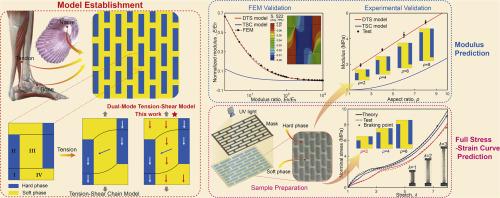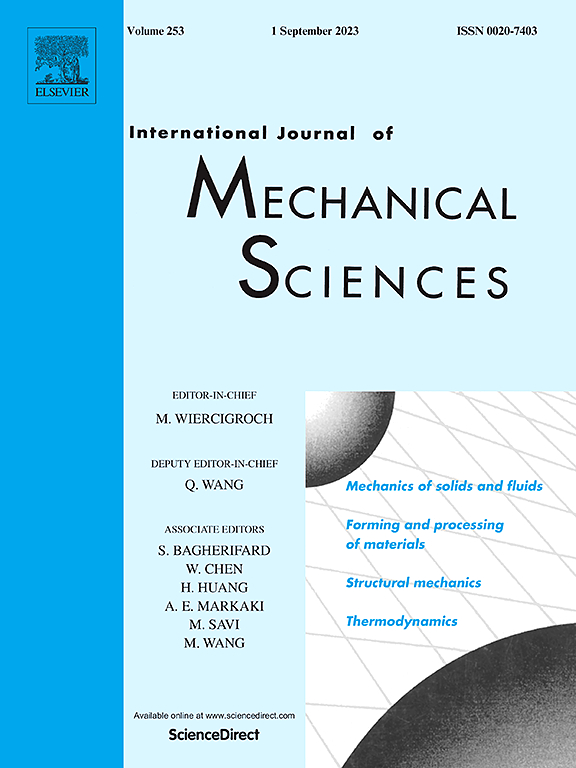Dual-mode tension-shear model for soft staggered composites
IF 9.4
1区 工程技术
Q1 ENGINEERING, MECHANICAL
International Journal of Mechanical Sciences
Pub Date : 2025-09-09
DOI:10.1016/j.ijmecsci.2025.110818
引用次数: 0
Abstract
Emerging advancements in bioinspired composite research have refocused attention on architecture-property interactions within staggered hard/soft phase systems, particularly in soft staggered composites. Classical tension-shear chain (TSC) models fail to predict modulus in soft staggered composites with moderate-to-low modulus ratios (<1000) due to their neglect of soft-phase tensile contributions. To resolve this limitation, we develop a dual-mode tension-shear (DTS) constitutive model that unifies soft-phase tensile deformation and interfacial shear transfer. Validated by finite element analysis and heterogeneous ionogel experiments, the DTS model achieves high-accuracy modulus predictions across the full modulus-ratio spectrum (2–1000). Beyond infinitesimal strain characterization, DTS uniquely reconstructs full-range nonlinear stress-stretch responses without empirical calibration through phase-specific constitutive behaviors. This capability dramatically accelerates material development cycles. By bridging biomimetic theory with synthetic innovation, the framework enables optimized design of adaptive biomedical scaffolds, energy-dissipative metamaterials, and multifunctional tissue analogues.

软交错复合材料的双模拉伸-剪切模型
生物复合材料研究的新进展重新将注意力集中在交错硬/软相系统中的结构-性能相互作用上,特别是在软交错复合材料中。经典的拉伸-剪切链(TSC)模型由于忽略了软相拉伸的贡献,无法预测中低模量比(<1000)的软交错复合材料的模量。为了解决这一限制,我们开发了一种统一软相拉伸变形和界面剪切传递的双模拉伸-剪切(DTS)本构模型。通过有限元分析和非均相电离凝胶实验验证,DTS模型在全模比光谱(2-1000)范围内实现了高精度模量预测。除了无穷小应变表征,DTS独特地重建全范围非线性应力-拉伸响应,无需经验校准,通过相特异性本构行为。这种能力大大加快了材料开发周期。通过将仿生理论与合成创新相结合,该框架能够优化设计自适应生物医学支架、能量耗散超材料和多功能组织类似物。
本文章由计算机程序翻译,如有差异,请以英文原文为准。
求助全文
约1分钟内获得全文
求助全文
来源期刊

International Journal of Mechanical Sciences
工程技术-工程:机械
CiteScore
12.80
自引率
17.80%
发文量
769
审稿时长
19 days
期刊介绍:
The International Journal of Mechanical Sciences (IJMS) serves as a global platform for the publication and dissemination of original research that contributes to a deeper scientific understanding of the fundamental disciplines within mechanical, civil, and material engineering.
The primary focus of IJMS is to showcase innovative and ground-breaking work that utilizes analytical and computational modeling techniques, such as Finite Element Method (FEM), Boundary Element Method (BEM), and mesh-free methods, among others. These modeling methods are applied to diverse fields including rigid-body mechanics (e.g., dynamics, vibration, stability), structural mechanics, metal forming, advanced materials (e.g., metals, composites, cellular, smart) behavior and applications, impact mechanics, strain localization, and other nonlinear effects (e.g., large deflections, plasticity, fracture).
Additionally, IJMS covers the realms of fluid mechanics (both external and internal flows), tribology, thermodynamics, and materials processing. These subjects collectively form the core of the journal's content.
In summary, IJMS provides a prestigious platform for researchers to present their original contributions, shedding light on analytical and computational modeling methods in various areas of mechanical engineering, as well as exploring the behavior and application of advanced materials, fluid mechanics, thermodynamics, and materials processing.
 求助内容:
求助内容: 应助结果提醒方式:
应助结果提醒方式:


